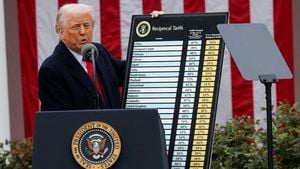European car manufacturers are bracing for significant challenges as U.S. President Donald Trump has threatened to impose hefty tariffs on imported vehicles. This move could spell disaster for the automotive industry in the European Union (EU), which relies heavily on exports to the United States.
According to the European Automobile Manufacturers Association (ACEA), more than one-fifth of EU car exports, approximately 22% in 2024, are sent to the U.S. market, making it the second largest destination for European car exports after China. This reliance on the U.S. market means that any new tariffs could have devastating effects on European manufacturers.
ACEA, representing 16 major car manufacturers, has raised alarms over the potential consequences of these tariffs. The organization asserts that these duties could lead to irreparable damage to the European automotive sector, which has already been grappling with various challenges in recent years.
In a recent statement, ACEA emphasized the importance of the U.S. market for European manufacturers, noting that these companies contribute significantly to job creation and economic growth in the United States. European manufacturers export between 50% and 60% of the vehicles they produce to the U.S., underscoring the critical nature of this trade relationship.
Moreover, the ACEA has highlighted that almost 15% of the vehicles exported from the EU to the U.S. are battery electric vehicles (BEVs), showcasing the growing importance of electric mobility in transatlantic trade. As the automotive industry shifts toward more sustainable options, these tariffs could hinder progress and innovation.
European manufacturers have a notable presence in the U.S., with hundreds of thousands of American jobs linked to the production and sale of European vehicles. The potential implementation of tariffs could not only jeopardize these jobs but also create significant customs barriers that would further complicate trade.
In addition to the economic implications, the labor cost disparity between European and American manufacturers poses another challenge. Car manufacturers in Europe face about one-third of the labor costs compared to their American counterparts. This cost advantage has allowed European manufacturers to compete effectively in the U.S. market. However, the introduction of tariffs could disrupt this balance, making it more difficult for European companies to maintain their competitive edge.
The automotive industry is at a crucial juncture, with the potential for tariffs to reshape the landscape of car manufacturing and sales between the EU and the U.S. As the situation develops, both sides of the Atlantic will be watching closely to see how these trade tensions unfold.
Ultimately, the stakes are high for European car manufacturers. With the U.S. market being a vital component of their export strategy, the imposition of tariffs could lead to a significant downturn in sales and production. The ACEA and its members are advocating for dialogue and cooperation to avoid such a scenario, emphasizing the mutual benefits of a healthy trade relationship.
As the automotive sector navigates these turbulent waters, the impact of U.S. trade policies on European manufacturers will remain a pressing issue. Stakeholders from both regions will need to engage in meaningful discussions to find solutions that support economic growth and innovation in the automotive industry.




